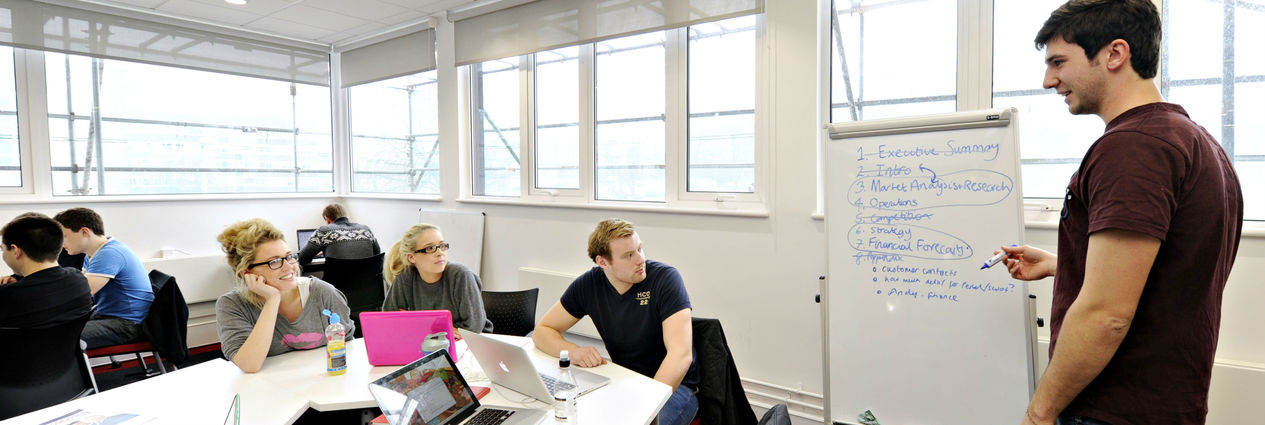SMART Courses
SMART has developed a complementary set of courses which cover a range of subjects of interest to those who are seeking to make their businesses more sustainable. These cover the following topics: Sustainable Development, Sustainable Business Management, Environmental Management Systems, Life Cycle Assessment, Sustainable Energy Systems, Waste Management and Product Recovery, Sustainable Product Design, Innovation Process and Project Management.
These courses are delivered at Loughborough University based on a set timetable as part of the MSc programme on Sustainable Engineering. If required, courses can also be run by request depending on numbers either at Loughborough, or on site with prior arrangement.
Sustainable Development: The Engineering Context
Module Aims: To provide students with an understanding of the principles and practices of sustainable development and to provide them with an understanding of how engineers can help manufacturing businesses develop into more sustainable enterprises.
Module Content: Human impact on the environment. Sustainable Development: objectives and principles. The Economic and Social dimensions of Sustainable Development. The ethical basis for sustainable businesses. Environmental legislation, to include the objectives of EU End-of-Life Directives. Resource conservation, to include: energy use and conservation; materials use and conservation; waste management and end-of-life product recovery. Management strategies for sustainable manufacturing businesses. The links between quality and sustainable practices. The financial costs and benefits of sustainable business practices. Environmental management systems: standards and practice. The role of sustainable product design and an introduction to Eco-Design and Life-Cycle assessment. A range of case studies will be used to demonstrate sustainable manufacturing practices and these will be drawn from topics that include: the automotive industry; waste management; and electrical and electronic products.
Sustainable Business Management
Module Aims: To provide an in-depth understanding of how business models can be developed to become more sustainable, particularly looking at the way in which businesses and consumers need to develop together. The types of business model which are likely to enable this objective are explored, as well as how society needs to change to support long-term sustainability and how to overcome transition problems.
Module Content: This module will address several key issues related to energy, including: Principles of sustainable business models; Life-cycle costing and cost benefit analysis; Implications of cost benefit analysis on Eco-design; Corporate responsibility and cradle-to-cradle management; Product service systems and remanufacturing; Local manufacturing and flexible reconfigurable production; and Consumption models.
Environmental Management, Standards, Legislation and Directives
Module Aims: The aim of this module is to provide an understanding of the regulatory framework, social context and business drivers that require businesses to respond positively to the need for improved environmental management and sustainability.
Module Content: The Environmental Management systems module involves an integrated approach to managing and monitoring a company's environmental impact and complying with environmental regulations. The module content will include an introduction to Environmental Management, environmental management standards including BS7750, ISO 140001 and EMAS, and health and safety at work. Further topics will include environmental auditing, environmental regulation and legislation and the preparation, implementation and reviewing of environmental policy for manufacturing companies.
Life Cycle Assessment
Module Aim: To explain the concept of life-cycle and the importance of understanding that a product's influence on the environment extends from the extraction and processing of the materials used in its production, the manufacturing phase through to the use phase, and finally to the treatment of the product at the end of its useful life.
Module Content: The module will define a methodology and introduce associated tools with which to conduct a life-cycle assessment. Topics within this module include an introduction to LCA, ISO 14040-49 standards, a framework for Goal and Scope, Definition, life-cycle inventory and analysis, life-cycle impact analysis, and an introduction to an LCA software package.
Waste Management and Product Recovery
Module Aim: To introduce and explore factors influencing waste management and product recovery processses at each stage of a product's lifecycle; and to develop an understanding of how product design and consumer behaviour can impact these processes.
Module Content: The module will address waste management and the waste hierarchy, controlled and uncontrolled waste, environmental laws and regulations associated with the generation, treatment and disposal of waste, waste processing procedures, waste minimisation programmes, and product recovery techniques, such as reuse, remanufacturing and recycling.
Sustainable Energy Systems
Module Aim: To provide an integrated approach to understanding energy utilisation, energy management techniques, and energy rationalisation within a manufacturing environment; and the difficulties in achieving long-term energy security including the best methods to reduce industrial reliance on fossil based sources.
Module Content: This module will address several key issues related to energy including: energy usage trends and future supply shortages; climate change and carbon sequestration; policy, drivers and legislation; renewable energy and alternative energy sources; energy rationalisation and energy efficiency considerations; and, energy management from a manufacturing perspective.
Sustainable Product Design
Module Aim: To provide an understanding of the tools and techniques available to facilitate sustainable product design and provide knowledge of the product design processes that can reduce environmental impacts and promote sustainable practices.
Module Content: Sustainable product design and related concepts. Design for the Environment. Quantitative and qualitative design guides. Eco-design. Life-cycle assessment. Eco-Indicator: an introduction and practical case studies. Producer responsibility legislation. Design for disassembly/re-use/re-manufacturing/recycling and serviceability. Sustainable product design strategies and case studies. Group project activities.
The Innovation Process and Project Management
Module Aim: To establish a clear overview of the innovation process and an understanding of the essential elements within it. To provide the student with strategies for planning and carrying out innovative projects in any field.
Module Content: An overview of design and innovation processes. Project core phases. Project planning and management. Quality. The human side of innovation; creativity, teamworking, skills and techniques. New product development; product design strategies; means of reducing risk of failure; application in different industries; Intellectual Property.
